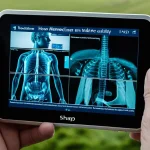Overview of Innovations Shaping UK Healthcare
In 2024, UK healthcare innovation is rapidly evolving, driven by significant advances in digital transformation in healthcare. The NHS has become a central figure in this revolution, spearheading numerous technology initiatives designed to improve patient outcomes while optimizing operational efficiency. These efforts encompass cutting-edge technologies like AI diagnostics, remote monitoring devices, and interoperable health records, which are increasingly integrated across NHS systems.
The scale of digital adoption by the NHS reflects its strategic commitment to modernizing healthcare delivery nationwide. Key initiatives include implementation of data-driven decision-making tools and enhancing telehealth services, enabling more accessible care beyond traditional clinical settings. This digital shift not only improves timely access but also supports personalised treatments tailored to patient-specific data.
Also to read : How Are Advancements in UK Health Technology Shaping the Future of Patient Care?
Moreover, the NHS prioritizes innovation partnerships, collaborating with tech firms and startups to accelerate the introduction of transformative solutions. These collaborations foster a healthcare environment where technology acts as both an enabler and a catalyst for ongoing improvements.
Overall, the landscape of UK healthcare innovation in 2024 illustrates a robust, tech-driven transformation led by the NHS, with positive ripple effects across patient care quality and system sustainability.
In the same genre : How Is Technology Transforming Healthcare Practices in the UK?
Artificial Intelligence in Healthcare Practice
Artificial Intelligence (AI) has become a transformative force in healthcare. In the UK, NHS artificial intelligence initiatives are increasingly integrated into clinical workflows. These technologies predominantly focus on enhancing diagnostics, patient triage, and workflow management. For example, machine learning UK health applications can analyze complex medical images to detect diseases faster and with higher accuracy than traditional methods.
NHS artificial intelligence systems assist healthcare professionals by prioritizing patients based on severity, speeding up care delivery. This reduces waiting times and optimizes staff allocation. Moreover, AI streamlines administrative tasks such as appointment scheduling and medical record management, allowing clinicians more time for patient care.
However, while healthcare AI offers significant benefits including improved accuracy and efficiency, there are notable limitations. Data privacy concerns and algorithmic biases remain challenges that need addressing. Additionally, AI tools require continuous validation in clinical settings to ensure safety and reliability. NHS artificial intelligence projects often balance these pros and cons carefully to maintain patient trust and care standards.
In summary, healthcare AI in the UK represents a blend of innovation and caution, improving patient outcomes while navigating ethical and practical hurdles. Exploring more on NHS artificial intelligence can offer deeper insights into these evolving technologies.
Rise of Telehealth and Remote Care Solutions
Telemedicine UK has seen significant growth, revolutionising how patients access healthcare. Virtual healthcare platforms allow consultations directly from home, reducing travel time and increasing convenience. This shift benefits those in rural areas or with mobility challenges, ensuring timely medical advice without physical visits.
Remote patient monitoring NHS initiatives complement virtual consultations by tracking vital signs and health data continuously. Devices enable clinicians to observe patients’ conditions in real time, allowing proactive management and reducing hospital admissions. This seamless blend of telemedicine UK and remote monitoring supports ongoing care beyond traditional settings.
The NHS actively promotes telehealth services expansion. Strategies include investing in digital infrastructure and training healthcare professionals to adopt virtual tools effectively. By doing so, patient access improves, especially amid pressures on in-person appointments. Moreover, telemedicine UK aligns with broader healthcare goals: enhancing care continuity and reducing system burdens.
Patients experience better outcomes and convenience through these technologies. As virtual healthcare evolves, its integration within the NHS framework promises a more resilient, accessible medical system in the UK. Understanding telemedicine UK’s role highlights its transformative impact on future healthcare delivery.
Digital Health Records and Data Integration
The journey toward standardizing electronic health records UK has gained momentum, especially with the NHS digital transformation initiatives. Central to this effort is achieving health data interoperability, which ensures that patient information flows seamlessly between healthcare providers. This integration significantly enhances patient safety by minimizing errors and enables better continuity of care when patients access multiple services or switch providers.
Moreover, having interoperable systems amplifies the potential for clinical research. Researchers can analyze comprehensive datasets that span regions, improving insights into treatment efficacy and public health trends. However, integrating digital health records poses considerable challenges, especially concerning data security. Protecting sensitive information requires robust encryption, strict access controls, and compliance with stringent regulations like GDPR.
Healthcare organizations must balance the benefits of data sharing with safeguarding patient privacy. Implementing uniform standards across all NHS trusts and health systems remains complex but crucial. These infrastructures support not only healthcare delivery but also empower patients with better access to their health information, encouraging active involvement in their treatment journeys. The ongoing push for interoperability marks a pivotal step in modernizing the UK’s healthcare landscape.
Advancements in Personalized and Genomic Medicine
Personalized medicine is transforming healthcare in the UK, largely driven by the NHS Genomic Medicine Service. This service integrates genomics NHS capabilities to provide precision medicine UK approaches tailored to an individual’s genetic profile. By analyzing a patient’s DNA, doctors can develop more effective, targeted treatments that significantly improve outcomes compared to traditional methods.
One of the key breakthroughs in personalized healthcare innovations is the ability to identify genetic markers linked to diseases such as cancer, rare disorders, and cardiovascular conditions. This enables clinicians to prescribe therapies that are not only specific to the patient’s genetic makeup but also minimize harmful side effects. For example, genomics NHS efforts have led to targeted cancer therapies that exploit weaknesses in tumor cells, resulting in higher remission rates.
Despite these successes, several barriers hinder widespread adoption. High costs, infrastructure demands, and the need for specialist genetic counselors limit access. Additionally, data privacy concerns and the complexity of interpreting genomic information pose challenges. However, ongoing investments and policy support are helping to tackle these obstacles, gradually expanding the reach of precision medicine UK and personalized healthcare innovations.
Expert Insights and Measurable Outcomes
In the realm of healthcare impact analysis, insights from leading clinicians and NHS digital leaders provide a critical lens through which the success of innovations can be measured. These experts stress that measurable patient outcomes—such as reduced hospital stay lengths and improved recovery rates—are at the forefront of assessing the tangible benefits of NHS innovations.
Recent data reveals that digital tools like remote monitoring and AI-assisted diagnostics have generated positive results. For instance, patient readmission rates have decreased, demonstrating the practicality of these innovations. However, expert commentary in UK healthcare also highlights gaps, such as uneven adoption across regions and the need for integration with existing clinical workflows.
Critically, sustaining these improvements involves prioritizing interoperability and staff training. Experts agree that future priorities must focus on expanding data-sharing capabilities and fostering user-friendly digital environments to maximize healthcare impact analysis. This dual approach promises to enhance patient outcomes and drive forward innovation results NHS-wide, ensuring technology delivers real-world value rather than theoretical promise.
By aligning innovations with focused healthcare impact analysis, the NHS can continue evolving in ways that benefit patients and empower clinicians effectively.



